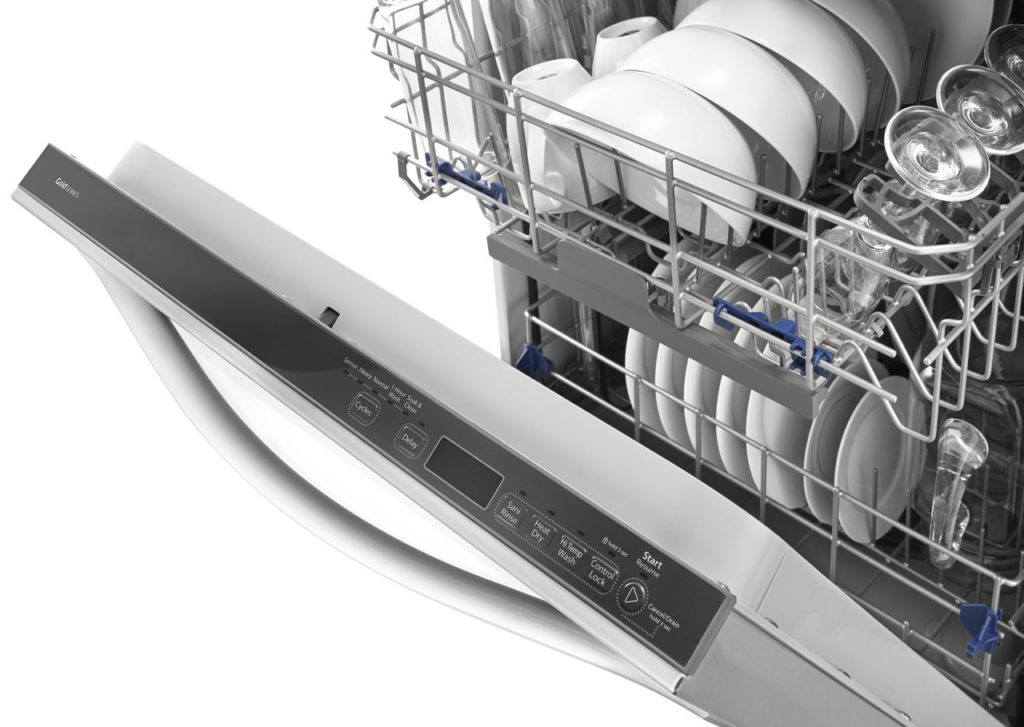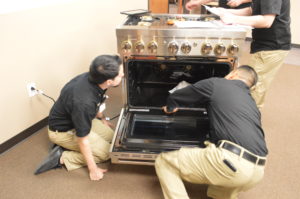A few days ago, as we were helping our sister clean out the filters on her dishwasher, she mentioned it had started to smell pretty bad. We received a blank stare when we asked if she had read our blog specifically covering dishwasher smells and how to take care of it. It then occurred to us that if our beloved family member didn’t catch that blog…. there’s probably a number of you out there who missed it as well. So! Let’s revisit how to get your dishwasher cleaned up and smelling spiffy for Spring. You can also go back and read the original info on How to Clean Your Dishwasher blog.
Some people consider it an old fashioned notion, but Spring cleaning is upon us and there’s something about cleaning out and reorganizing the household this time of year when everything is fresh and new. Sometimes we overlook including our appliances on the checklist, but we definitely do not want to leave out the dishwasher! Many customers call us because there’s a foul smell coming from their dishwasher or perhaps, their dishwasher isn’t cleaning their dishes or drying properly. Either way, we’re here to share with you some cleaning tricks, maintenance tips and safety instructions to have your dishwasher running smoothly and cleaning those dishes!
Maintenance Tips
- Many dishwashers are designed to use rinse aids. The use of rinse aids can improve the drying process by allowing water to drain from the dishes after the final rinse. It also keeps water from forming spots or streaks.
- Don’t slam your dishwasher door.
- Whenever you’re away for awhile or not utilizing your dishwasher, turn off the water supply. This not only saves the hoses from strain, but it also saves you money!
- Make sure the water supply lines are protected against freezing conditions. When 32 degrees or below, open your cabinet doors underneath your sink to keep it warmer. Luckily, we don’t have to worry about that again for awhile. NOTE – Damage to your home due to freezing pipes is not covered by warranty.
- Whirlpool recommends the use of high-quality, premeasured detergent tablets or packs and the use of rinse aid for dishwasher cleaning and daily care.
- Always refer to your Use and Care Guide from your manufacturer!

Cleaning Tricks
- Clean the exterior of dishwasher with a soft, damp cloth and mild detergent.
- If your dishwasher has a stainless steel exterior, a stainless steel cleaner, such as affresh® Stainless Steel Cleaner is recommended. Avoid using abrasive cleaning products on the exterior of the dishwasher.
- For the interior of your dishwasher, you can always try a vinegar rinse if running a regular cycle by itself doesn’t do the trick. Place (do not pour), 2 cups (500 mL) white vinegar in a glass or dishwasher-safe measuring cup on the bottom rack. Run the dishwasher through a complete washing cycle using an air-dry or an energy-saving dry option. Do not use detergent. Vinegar will mix with the wash water. NOTE – vinegar is an acid and using it too often could damage your dishwasher.
- Always refer to your Use and Care Guide from your manufacturer!
Safety Instructions
- Read all instructions in your Use and Care Guide before using the dishwasher.
- Use the dishwasher only for washing dishes. No less, no more!
- Refer to your Use and Care Guide for recommended detergents and rinse agents. Make sure to keep them tucked away from the kiddos.
- When loading your dishwasher, locate sharp knives and place them handle up to prevent cuts and damage to your door seals.
- Only wash plastic items that are marked “Dishwasher Safe.”
- Don’t touch the heating element at the bottom of your dishwasher, during or immediately after use.
- Do not operate the dishwasher unless all enclosure panels are properly in place.
- The dishwasher isn’t a toy, or a hiding place. Don’t abuse, sit on, stand on the door, etc. You get the idea.
- Under certain conditions, hydrogen gas may be produced in a hot water system that has not been used for two weeks or more. HYDROGEN GAS IS EXPLOSIVE. If the hot water system has not been used for such a period, before using the dishwasher turn on all hot water faucets and let the water flow from each for several minutes. This will release any accumulated hydrogen gas. As the gas is flammable, do not smoke or use an open flame during this time.
- Remove the door or lid to the washing compartment when removing an old dishwasher from service or discarding it.
Guinco is always here to help with handy tips, and we hope you find the above information helpful. Spring cleaning can be made so much easier when you maintain your appliances per your Use and Care Guide. If you run into a leak, wet dishes after a dry cycle, or any other issues with your dishwasher, please reach out to us so we may send a trained professional to your home to diagnose the problem. As always, thank you for letting our family help yours!




